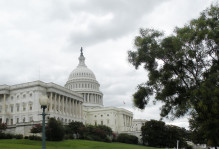Speakers and Strategy
The topic of my DC winter seminar is International Relations: U.S. Grand Strategy in the 21st Century. So far, we have studied various grand strategies in the classroom. Today we were able to discuss the differing opinions on grand strategy with four speakers who came to our class over the course of the day. First, Lieutenant Colonel Stephanie Ahern spoke with us about strategy making. Ahern is a strategist who works to develop the Quadrennial Defense Review, which identifies the priorities and strategies of the Department of Defense. She identified goals of ensuring the defense of the United States, including protecting the homeland, building security globally to deter adversaries and reassure allies, and projecting power to the world. Ahern also mentioned some challenges that affect creating a strategy, including the need to think of future threats and capabilities, compromising when many interests are involved, and constraints on the budget. Following Lieutenant Colonel Ahern, Christopher Mewett, a legislative assistant to Senator Sheldon Whitehouse, spoke to us about his skepticism of the idea of grand strategy. Mewett made us think critically about the usefulness of a grand strategy if it does not even have a clear definition. He also warned that grand strategies may have “pernicious” side effects by making everything a competitive national security issue, which may take away from domestic and economic interests. After lunch, we had two more speakers. The first was from the Department of State. He gave us a historical overview of grand strategy, from ancient China to present day. His characteristics of a successful grand strategy was to be flexible, to take account of of national limitations, and to leave the nation more secure. Our last speaker was David Gordon, a senior advisor of Eurasia Group and previously the director of policy planning to Secretary of State Condoleezza Rice. He first explained two of the United States’ grand strategies that he had seen over the years, one during the Cold War and one in the years following 9/11. Later he identified the five major threats he believes the United States faces: cyber attacks, China, Russia, ISIS and al-Qaeda; we then considered why they were such large threats and how to combat them.
Today was packed full of discussion, and tomorrow we will have our first site visit. We also have a speed networking dinner tomorrow, so it is sure to be an exciting day.
-Katie Koontz ’19



No comments.
Comments are currently closed. Comments are closed on all posts older than one year, and for those in our archive.